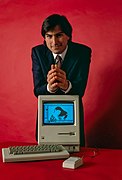The Internet PortalThe Internet (or internet) is the global system of interconnected computer networks that uses the Internet protocol suite (TCP/IP) to communicate between networks and devices. It is a network of networks that consists of private, public, academic, business, and government networks of local to global scope, linked by a broad array of electronic, wireless, and optical networking technologies. The Internet carries a vast range of information resources and services, such as the interlinked hypertext documents and applications of the World Wide Web (WWW), electronic mail, telephony, and file sharing. The origins of the Internet date back to research that enabled the time-sharing of computer resources and the development of packet switching in the 1960s. The set of rules (communication protocols) to enable internetworking on the Internet arose from research and development commissioned in the 1970s by the Defense Advanced Research Projects Agency (DARPA) of the United States Department of Defense in collaboration with universities and researchers across the United States and in the United Kingdom and France. The ARPANET initially served as a backbone for the interconnection of regional academic and military networks in the United States to enable resource sharing. The funding of the National Science Foundation Network as a new backbone in the 1980s, as well as private funding for other commercial extensions, encouraged worldwide participation in the development of new networking technologies and the merger of many networks using DARPA's Internet protocol suite. The linking of commercial networks and enterprises by the early 1990s, as well as the advent of the World Wide Web, marked the beginning of the transition to the modern Internet, and generated sustained exponential growth as generations of institutional, personal, and mobile computers were connected to the network. Although the Internet was widely used by academia in the 1980s, the subsequent commercialization in the 1990s and beyond incorporated its services and technologies into virtually every aspect of modern life. (Full article...) Selected article
4chan is an English-language imageboard website based on the Japanese-language Futaba Channel. Launched on October 1, 2003 by "moot" ("Christopher Poole"), its boards are based primarily around the posting of pictures and discussion of Japanese comics and television shows. Users generally post anonymously, and the site has been linked to "Anonymous" culture and Project Chanology. 4chan's "/b/" board, dedicated to random postings, is the most active and is notorious on the Internet. The site has generated significant media attention, and its members have been responsible for the formation and popularization of several Internet memes such as lolcats, rickrolling, and the popularity of the Tay Zonday song "Chocolate Rain". It has also received media attention for its attacks against other websites and Internet users, and for the threats of real world violence that have been posted on it.
Selected picture A hotspot is a venue that offers Wi-Fi access. The public can use a laptop, WiFi phone, or other suitable portable device to access the Internet. Of the estimated 150 million laptops, 14 million PDAs, and other emerging Wi-Fi devices sold per year for the last few years, most include the Wi-Fi feature. News
Wikinews Internet portal
WikiProjects
Did you know (auto-generated) -
Selected biographyLeonard Kleinrock (born June 13, 1934 in New York) is a computer scientist, and a professor of computer science at UCLA, who made several important contributions to the field of computer networking, in particular to the theoretical side of computer networking. He also played an important role in the development of the ARPANET at UCLA. His most well-known and significant work is his early work on queueing theory, which has applications in many fields, among them as a key mathematical background to packet switching, the basic technology behind the Internet. His initial contribution to this field was his doctoral thesis in 1962, published in book form in 1964; he later published several of the standard works on the subject. His theoretical work on hierarchical routing, done in the late 1970s with his then-student Farouk Kamoun, is now critical to the operation of today's world-wide Internet. General images -The following are images from various internet-related articles on Wikipedia.
Selected quoteMore Did you know...
Main topics
Featured contentCategoriesRelated portalsThings you can do
Associated WikimediaThe following Wikimedia Foundation sister projects provide more on this subject:
Wikipedia's portalsDiscover Wikipedia using portals |
How Can We Help?























































Recent Comments